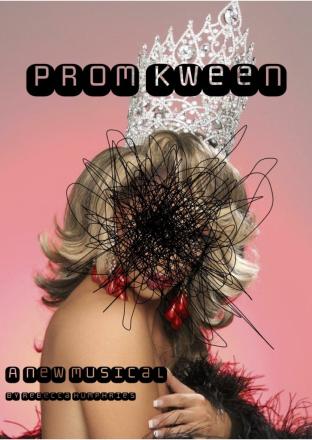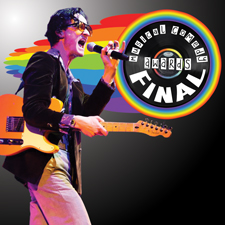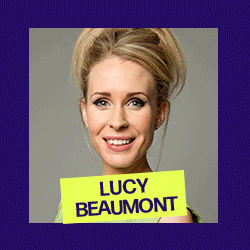
I’m what they call a “serious actress”. No, seriously. I have worked at St Paul’s Cathedral during the Occupy London protests at the Donmar Warehouse, jumped in front of a train in 19th Century Russia at the Hampstead Theatre, and even done a stint as a prostitute at the National. The performers in my new musical Prom Kween are mostly classically trained, have credits including the Almeida, Royal Shakespeare Company and ITV Drama amongst them.
This isn’t my first time at the rodeo. In 2014 I wrote and performed a one woman comedy hour - Dizney Rascal - at the Edinburgh Fringe. It was eye-opening and stressful and glorious and I remember thinking very clearly ‘that was great, but never again’.
In 2015 I entered the Musical Comedy Awards. After each round I vowed it wasn’t worth the anxiety and tension, no matter the elation I felt when it had gone well. I got to the final. I almost didn’t go. I went, and won. ‘That was brilliant!’ I told everyone that would listen. ‘But never again!’
Well, next week I have my first comedy musical, Prom Kween, being performed as part of the Vault Festival. The process leading up to this point has made me howl with laughter, and have the closest thing I’ve ever had to a nervous breakdown. (NOTE: my boyfriend just read this and informed me that no, it was an actual nervous breakdown).
So why do I keep coming back?
Well, firstly I think it’s a mistake I and many others constantly make: assuming the business of comedy will be frivolous and fun. Sure, some of it is. But in my experience, the good stuff - and why would you not want to make good stuff? - is hard. I’ve had hour-long arguments about whether a punchline will work. I’ve sulked over disagreements with friends about where is funniest to stand onstage I’ve been in enough writers rooms and seen enough stand ups write and rewrite material now to realise comedy is a serious business. As serious as serious theatre.
One of my cast members, Sule Rimi, has recently finished ‘Mary Stuart’ at the Almeida. He insists the approach to the different genres has to be the same. ‘It’s all storytelling. Sometimes you have to try and be funny and sometimes to have to go to dark places - and that’s regardless of whether it’s a drama, comedy, tragedy, musical’.
Sean Rigby, of ITV’s Endeavour, agrees: ‘Going in to a project, drama or comedy, with preconceived ideas is a recipe for disappointment. Comedy can be profound. Drama can be lightweight.’
Difficulties aside, there’s a joy in the honesty of comedy. It has a clear objective, and that’s to make people laugh. You know if it’s not going well. In theatre you can kid yourself that you’re doing an excellent job, that they’re ‘quietly enjoying it’ when actually you’re in a 2 star production that’s charged people £65 a ticket. That kind of delusion is toxic to any kind of progress. In comedy if you can’t hear them, you know you have to make it better.
Any joy I’ve felt at making great theatre, at making people feel.....it’s often come at expense to myself (my sanity). I’ve had to sob onstage, wail, attempt suicide, run around the theatre soaking wet and covered in fake mud and blood every night for months. I played one role over a period of about eleven months. She was a severely depressed recluse who was on the run with her small child from her abusive police officer husband, and had no choice but to turn to prostitution. My job is to consider in a thorough way her thoughts, feelings, pain, fears, worst nightmares and then inhabit them and show a group of people in the most accurate, specific way I can every single night. As wanky as it sounds, those thoughts and feelings do blur in to your real life. You don’t get that when you’re singing songs about Disney, believe me.
In theatre we talk about being in the moment, it’s considered the holy grail. To make pre-written lines truly fresh, to forget you’re onstage and feel as the character feels is not only the greatest feeling ever as an actor, it’s also the rarest. In comedy it’s something you’re forced to be. You’re on your own, you’re sensing the room, making adjustments or ad-libbing whether it’s going well or not. And to experience that in comedy, and then taking it back to the theatre, is in my opinion one of the biggest rewards.
Sean spotted another transferable skill: ‘Timing is everything in comedy. And it can be overlooked as an important part of drama. So anything that informs and hones your ability to spot the beats is useful.’
Then there’s the stuff that sounds obvious. While I being part of a company, there’s a confidence that comes with having achieved something on your own. Once you’ve died in front of an audience, suddenly auditions seem less terrifying. When it goes well, my god, there’s genuinely nothing like it.
And you know what, despite the nerves and stress and an air of general apprehension creating this musical has brought to my life, it has been a laugh.
But never again.
Prom Kween is at the Vault Festival 15-19 February, book here.






